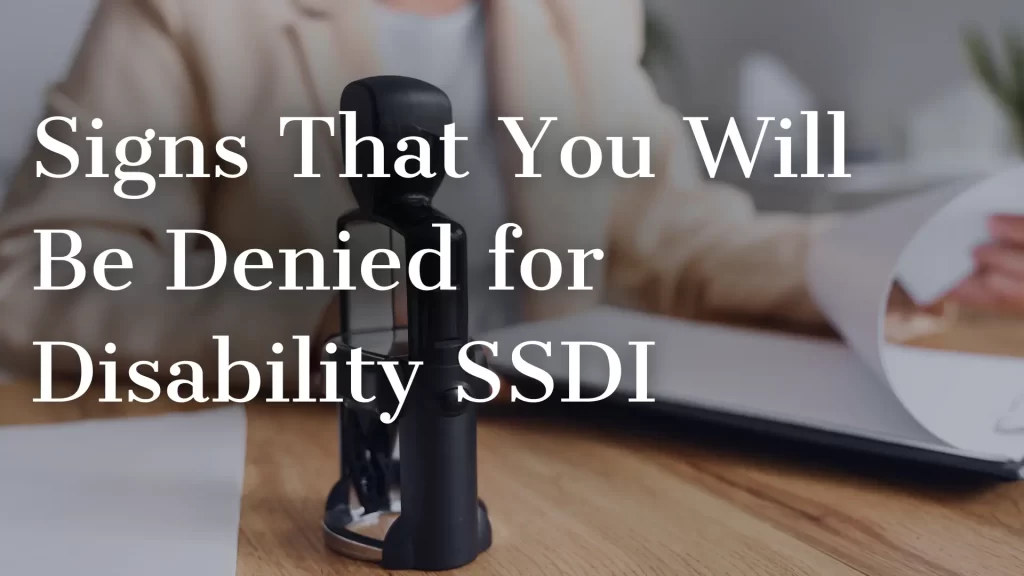
Applying for Social Security Disability Insurance (SSDI) can be a daunting and frustrating process, especially because you’re unsure whether your claim will be approved. The unfortunate reality is that a significant number of initial SSDI claims are denied, leaving applicants struggling to make ends meet while dealing with the challenges of their disabilities.
Understanding the common signs that you will be denied for disability SSDI is crucial for increasing your chances of approval. By recognizing potential red flags and taking proactive steps to address them, you can better prepare your application and build a stronger case for the benefits you deserve.
Insufficient Medical Evidence
One of the most common reasons for SSDI denial is insufficient medical evidence. The Social Security Administration (SSA) requires comprehensive documentation of your medical condition, including diagnoses, treatment records, and functional limitations. If your medical records do not adequately demonstrate the severity and duration of your disability, your claim may be denied.
To avoid this, ensure that you provide detailed medical records from all healthcare providers involved in your treatment. This may include primary care physicians, specialists, therapists, and hospitals. The records should clearly outline your diagnosed conditions, symptoms, treatment plans, and how your disability affects your ability to work.
Failure to Follow Prescribed Treatment
The SSA expects applicants to follow their prescribed treatment plans unless there is a valid reason for not doing so. Your claim may be denied if you fail to adhere to your doctor’s recommendations or refuse treatment without a good cause. The SSA may interpret this as an indication that your condition is not as severe as claimed or that you are not trying to improve your health.
If you have difficulty following your treatment plan due to financial constraints, side effects, or other reasons, communicate these concerns to your healthcare provider and the SSA. They may be able to offer alternative solutions or consider your circumstances when evaluating your claim.
Substantial Gainful Activity
In order for you to qualify for SSDI, your disability must prevent you from engaging in substantial gainful activity (SGA). The monthly SGA threshold for 2024 is $1,550 per month for non-blind individuals and $2,590 for blind individuals. If you work and earn above these limits, your claim will likely be denied, as the SSA considers you capable of performing work despite your disability.
However, some exceptions and special programs allow SSDI recipients to test their ability to work without immediately losing their benefits. If you are considering returning to work or have questions about how employment may affect your SSDI eligibility, consult with a qualified disability attorney.
Failure to Cooperate with the SSA
Throughout the SSDI application process, the SSA may request additional information, forms, or medical exams. Failing to cooperate with these requests can lead to a denial of your claim. It is crucial to promptly respond to any correspondence from the SSA and attend all scheduled appointments or examinations.
If you cannot attend an appointment or provide the requested information within the given timeframe, notify the SSA as soon as possible and explain your situation. They may be able to accommodate your needs or grant an extension.
Age, Education, and Work Experience

The SSA considers factors such as age, education, transferable skills, and work experience when evaluating SSDI claims. If you are younger, have a higher level of education, or have transferable job skills, the SSA may determine that you are capable of adjusting to other types of work, even if you cannot perform your previous job.
It is essential to provide evidence demonstrating how your disability specifically limits your ability to perform any type of work, regardless of your age, education, or experience. This may include functional capacity evaluations, vocational expert testimony, or statements from former employers.
Contact a Disability Lawyer to Help with Your SSDI Application
The SSDI application process can be complex and challenging, but understanding the potential reasons for denial can help you work through the system more effectively. The wisest course is to hire an SSDI lawyer before you file your initial SSDI claim.
If you need assistance with your application, or if your initial application has already been denied, contact the experienced Social Security disability attorneys at Fusco, Brandenstein & Rada, P.C. by calling 516-496-0400 or contacting us online. Our knowledgeable team is dedicated to helping individuals with disabilities secure the benefits they deserve. Reach out today for your free consultation to learn more about how we can help.
